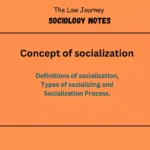State Commission – Under Section 42 of the CPA, 2019 the State Government shall, by notification, establish a State Consumer Disputes Redressal Commission, to be known as the State Commission, in the State.
Composition | State Consumer Disputes Redressal Commission
Each State Commission shall consist of-
- a President; and
- not less than four or not more than such number of members as may be prescribed in consultation with the Central Government.
Qualifications for appointment [Section 43]
- He should be a Judge of the High Court either serving or retired.
- He should have at least forty years of age.
- He should have an experience of at least ten years as presiding officer of a district court or of any tribunal at equivalent level or combined service as such in the district court and tribunal.
- He should have a bachelor’s degree from a recognised university.
- He should be a person of ability, integrity and standing, and has special knowledge and professional experience of not less than twenty years in consumer affairs, law, public affairs, administration, economics, commerce, industry, finance, management, engineering, technology, public health or medicine:
- At least one member or the President of the State Commission shall be a woman.
Vacancy | State Consumer Disputes Redressal Commission
In case of a casual vacancy in the office of President in the State Commission, the State Government shall have the power to appoint the senior most member to officiate as President.
Procedure of Appointment [Section 43]
The President and members of the State Commission shall be appointed by the State Government on the recommendation of a Selection Committee, consisting of the following persons, namely:-
(a) Chief Justice of the High Court or any Judge of the High Court nominated by him (Chairperson)
(b) Secretary in charge of Consumer Affairs of the State Government (Member)
Resignation by President or Member of State Commission [Section 43]
The President or any member may, by writing under his hand addressed to the State Government, resign his office at any time but he will continue to hold office –
- until the expiry of three months from the date of receipt of such notice, or
- until a person duly appointed as a successor enters upon his office, or
- until the expiry of his term of office.
Removal of President or Member of State Commission from office [Section 43]
The State Government shall remove from office any President or Member, who
- has become insolvent
- has been convicted of an offence which involves moral turpitude
- is physically or mentally incapable
- has acquired financial or other interest
- has abused his position
Term of Office of President or Member [Section 43]
The President and each member of the State Commission shall hold office for a term of four years or up to the age of sixty-five years and shall be eligible for reappointment for another term of four years based on the basis of the recommendation of the Selection Committee.
Salaries and allowances [Section 44]
- The President is entitled to the same pay and allowances as a High court Judge.
- A Member shall be paid the minimum salary of a Additional Secretary of the State Government, as well as any extra allowances that may be granted to such person.
Jurisdiction of State Commission [Section 47]
Pecuniary Jurisdiction – The State Commission shall have jurisdiction to hear complaints when the value of the goods or services paid as consideration exceeds rupees one crore, but does not exceed rupees ten crore, provided that the Central Government may prescribe such other value as it considers essential.
Appellate Jurisdiction – The State Commission shall have jurisdiction to entertain the appeals against the orders of any District Commission within the State and to call for the records and pass appropriate orders in any consumer dispute pending before or decided by any District Commission within the State, where it appears to the State Commission that such District Commission has exercised a jurisdiction not vested in it by law, has failed to exercise a jurisdiction so vested, or has acted illegally or with material irregularity in exercising its jurisdiction.
Territorial Jurisdiction – State Consumer Disputes Redressal Commission
A complaint shall be instituted in a State Commission within the limits of whose jurisdiction –
- the opposite party or each of the opposite parties, where there are more than one, ordinarily resides or carries on business or has a branch office or personally works for gain at the time of the institution of the complaint; or
- any of the opposite parties, where there are more than one, actually and voluntarily resides or works for gain at the time of the institution of the complaint.
- the cause of action, wholly or in part, arises; or
- the complainant resides or personally works for gain.
Limitation period [Section 69]
The State Commission shall not admit a complaint unless it is filed within two years from the date on which the cause of action has arisen. A complaint may be entertained after the period specified above, if the complainant satisfies the State Commission with a sufficient cause.
Proceedings before State Commission [Section 36 and 49]
- Every proceeding before the State Commission shall be conducted by the President of that Commission and atleast one member thereof, sitting together.
- On receipt of a complaint made under Section 35, the State Commission may, by order, admit the complaint for proceeding with it or reject it. It shall be decided within twenty-one days of the date on which the complaint was filed otherwise it is presumed to have been allowed.
- The State Commission has the power to require the production of any book, account, document, or commodity. Following an inspection of such seized documents or commodities, the State Commission may order their retention or return to the person involved.
Review by State Commission in certain cases [Section 50]
The State Commission shall have the power to review any of the order passed by it if there is an error apparent on the face of the record, either of its own motion or on an application made by any of the parties within thirty days of such order.
Appeal to National Commission [Section 51]
- Any individual who is dissatisfied with a State Commission order may file an appeal with the National Commission on the basis of facts or law within thirty days of the date of the order.
- The National Commission may hear an appeal after the expiration of the thirty day term if it is convinced that there was sufficient grounds for not submitting it within that period.
- If the National Commission is satisfied that the case involves a substantial question of law.
Finality of Orders [Section 68] | State Consumer Disputes Redressal Commission
Every order of the State Commission shall be final, if no appeal has been preferred against such order under the provisions of this Act.
Enforcement of Orders of State Commission [Section 71]
Every order made by a State Commission would be same as a decree made by a Civil Court in a suit.
Under Section 72, whoever fails to comply with any order made by the State Commission shall be punishable with imprisonment for a term of one month to three years, or with fine of twenty-five thousand rupees to one lakh rupees, or with both.
Administrative Control [Section 70] – State Consumer Disputes Redressal Commission
The State Commission shall have administrative control over all the District Commissions within its jurisdiction in the following matters, namely
- monitoring performance of the District Commissions.
- investigating into any allegations against the President and members of a District Commission and submitting inquiry report to the State Government concerned.
- issuance of instructions regarding adoption of uniform procedure in the hearing of matters.
- overseeing the functioning of the District Commission either by way of inspection or by any other means, as the National Commission may like to order from time to time.
Powers of State Commission | State Consumer Disputes Redressal Commission
The State Commission having administrative control over all the District Commissions enjoys all the powers of the district commission, which are as follows:-
- the summoning and enforcing the attendance of any person and examining such persons on oath.
- power to compel discovery and production of any material or object which may be produced as evidence.
- power to receive evidence by means of affidavit.
- power to obtain report from the concerned appropriate laboratory.
- power to issue commission for the purpose of examination of witness.
- any other matter relating to the subject-matter of dispute/complaint.
- Parties are entitled to cross-examine the witnesses.
- Power to pass interim order.
Related Post | State Consumer Disputes Redressal Commission
- Consumer Protection Councils
- Rights and Duties of consumers | Consumer Movement
- Standard of Goods – Consumer Protection Act
- Consumer of Goods – Consumer Protection Act
- Consumerism in India – Meaning | Need | Objects
1. What is the composition of the state commission?
Each State Commission shall consist of-
(a) a President; and
(b) not less than four or not more than such number of members as may be prescribed in consultation with the Central Government.
2. What qualifications are required to be a member or president of the state commission?
1. He should be a Judge of the High Court either serving or retired.
2. He should have at least forty years of age.
3. He should have an experience of at least ten years as presiding officer of a district court or of any tribunal at equivalent level or combined service as such in the district court and tribunal.
4. He should have a bachelor’s degree from a recognised university.
5. He should be a person of ability, integrity and standing, and has special knowledge and professional experience of not less than twenty years in consumer affairs, law, public affairs, administration, economics, commerce, industry, finance, management, engineering, technology, public health or medicine:
6. At least one member or the President of the State Commission shall be a woman.
3. How does a president or any member of the state commission can be removed?
The State Government shall remove from office any President or Member, who
(a) has become insolvent
(b) has been convicted of an offence which involves moral turpitude
(c) is physically or mentally incapable
(d) has acquired financial or other interest
(e) has abused his position
4. What is the term of the office of president or any member of the state commission?State Consumer Disputes Redressal Commission
The President and each member of the State Commission shall hold office for a term of four years or up to the age of sixty-five years and shall be eligible for reappointment for another term of four years based on the basis of the recommendation of the Selection Committee.
5. What is the jurisdiction of the state commission?State Consumer Disputes Redressal Commission
Jurisdiction of State Commission [Section 47]
Pecuniary Jurisdiction – The State Commission shall have jurisdiction to hear complaints when the value of the goods or services paid as consideration exceeds rupees one crore, but does not exceed rupees ten crore, provided that the Central Government may prescribe such other value as it considers essential.
Appellate Jurisdiction – The State Commission shall have jurisdiction to entertain the appeals against the orders of any District Commission within the State and to call for the records and pass appropriate orders in any consumer dispute pending before or decided by any District Commission within the State, where it appears to the State Commission that such District Commission has exercised a jurisdiction not vested in it by law, has failed to exercise a jurisdiction so vested, or has acted illegally or with material irregularity in exercising its jurisdiction.
Territorial Jurisdiction –
A complaint shall be instituted in a State Commission within the limits of whose jurisdiction –
(a) the opposite party or each of the opposite parties, where there are more than one, ordinarily resides or carries on business or has a branch office or personally works for gain at the time of the institution of the complaint; or
(b) any of the opposite parties, where there are more than one, actually and voluntarily resides or works for gain at the time of the institution of the complaint.
(c) the cause of action, wholly or in part, arises; or
(d) the complainant resides or personally works for gain.
6. Write about the provision of appeal against any order of the state commission.
Appeal to National Commission [Section 51]
· Any individual who is dissatisfied with a State Commission order may file an appeal with the National Commission on the basis of facts or law within thirty days of the date of the order.
· The National Commission may hear an appeal after the expiration of the forty-five-day term if it is convinced that there was sufficient grounds for not submitting it within that period.
· If the National Commission is satisfied that the case involves a substantial question of law.
7. How does administrative control over district commissions empowers state commission?
Administrative Control [Section 70]
The State Commission shall have administrative control over all the District Commissions within its jurisdiction in the following matters, namely
(a) monitoring performance of the District Commissions.
(b) investigating into any allegations against the President and members of a District Commission and submitting inquiry report to the State Government concerned.
(c) issuance of instructions regarding adoption of uniform procedure in the hearing of matters.
(d) overseeing the functioning of the District Commission either by way of inspection or by any other means, as the National Commission may like to order from time to time.
Reference Books | State Consumer Disputes Redressal Commission
- Consumer Protection Act: A Commentary by G. B. Reddy
- Consumer Protection Law by Dr.SC Tripathi
- Commentary on the Consumer Protection Act by J. N. Barowalia
- Consumer Protection (Law & Practice) by V. K. Agarwal




















